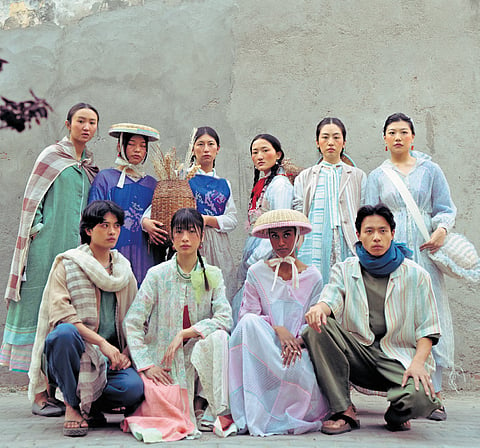

As the sun began its descent, casting a warm glow upon EKA’s experiential flagship store in the Lodhi Colony Market of Delhi, the spectators were transported to the enchanting town of Kohima, nestled amidst the hills of Nagaland. The runway, fashioned like a village road, came alive with models showcasing EKA’s Spring-Summer 2024 collection, aptly titled ‘Kohima’. A harmonious blend of handwoven Kota, cotton silks, Jamdani, and linens, the collection commanded attention with its bold patterns of checks and stripes elegantly juxtaposed against subdued, chalky pastels; each garment crafted with sophisticated prints.
“The idea was to bring freshness and innovation simultaneously. While the canvases are more or less the same as our previous collections, we only changed the treatment,” says EKA founder Rina Singh. The entire collection has ensembles with 14-20 block prints; around 28 dresses of the entire collection wear the prints. “It’s almost like an artwork,” Singh says. “There is no repeat of the block print, they are spontaneously and randomly placed. A lot is left to the block printers’ aesthetics.”
Neha Bagga, a visitor at the showcase says that she was “fascinated and transported to another realm by the collection.” Another visitor, Adil Hassan, comments: “It was one of the simplest, most effortless and graceful shows I’d seen in a while.” Astha Manchanda, a photographer, says Singh inspires “with her stories of textiles and the magic she weaves”.
Handloom magic
Handwoven textiles have always been synonymous with Indian summers; the ‘Kohima’ collection stays true to this tradition. Each piece, a nod to the modern woman, carried the essence of Indian artistry, reimagined for the discerning tastes of today. EKA’s distinctive aesthetic is captured in the embrace of soft layers adorned with unconventional cuts and fabrics that gracefully evolve with time, embodying the brand’s signature blend of effortless style and comfort. The collection is like poetry on clothes. “It serves as a jubilant tribute to femininity and the poetic nuances of life, skillfully weaving in vintage old-school styling and a touch of cottage core charm,” Singh says. The styling draws inspiration from local culture, merging transparency with the timeless allure of handwoven textiles.
It has become a ritual for Eka to pin locations across the country. The latest, in particular, is homage to the captivating landscapes, architectural wonders, and intricate cultural tapestry of Nagaland. It is a manifestation of EKA’s commitment to celebrating not just fashion but also the rich heritage and diverse inspirations that contribute to the tapestry of each collection. Singh says: “It is our way to attach ourselves to the culture, landscape and beauty and create a solid voice note for India; a strong Indian voice but with international aesthetic.” Recalling the nuances of the Kohima village, the designer reminisces: “Their lifestyle is extremely tribal and rural, but it also has a semi-urban side. The vocabulary in terms of the colour structure of the architecture is beautiful. The cottages made of wood are loaded with flowers with giant mountains in the backdrop. It is a one-of-a-kind setting.”
The Ghibli aesthetic
Singh’s vision to capture the natural beauty of Kohima’s terrain found its perfect pairing with the Ghibli aesthetic – a Japanese art style for films. “I cannot imagine Ghibli in India without Kohima. The two are complementary,” she says. The lineup showcases nostalgic dresses in saccharine tones and the layers reminiscent of watercolours. These designs also reflect Singh’s ethos of embracing a life of simplicity and a deep appreciation for nature. Singh, a small-town girl, believes “textile culture is largely rural and is a potent sentiment which should be expressed through brands like ours to the world. We just have to find new vocabulary and treatment to express ourselves.”